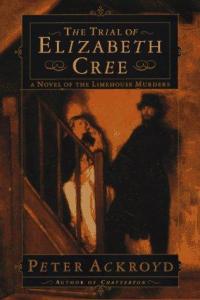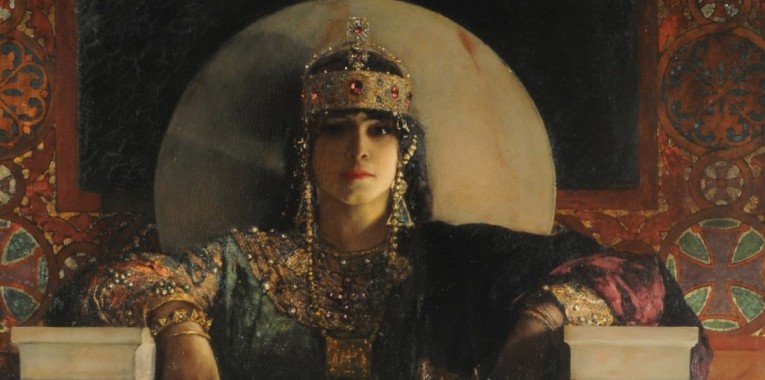The theme of “On Stage” takes a darker turn this week as I expand into film. The Limehouse Golem is a 2016 film adapted by screenwriter Jane Goldman and based on Peter Ackroyd’s 1994 novel Dan Leno and the Limehouse Golem, which was also published as The Trial of Elizabeth Cree. I can’t talk about it without giving away secrets, so be aware that spoilers abound!
 The story opens with Elizabeth Cree (portrayed by Olivia Cooke in the movie), “Little Lizzie” as she’s known in the stage circles, being accused of poisoning her husband, John, a reporter and playwright, based on the evidence that she prepared his nightly draught, which was laced with poison.
The story opens with Elizabeth Cree (portrayed by Olivia Cooke in the movie), “Little Lizzie” as she’s known in the stage circles, being accused of poisoning her husband, John, a reporter and playwright, based on the evidence that she prepared his nightly draught, which was laced with poison.
In the midst of Lizzie’s trial, Inspector Kildare (Bill Nighy) gets handed the nigh-unsolvable case of the Limehouse Golem, a series of seemingly random and unconnected murders in the Limehouse district of London. The clues lead him to a journal, ostensibly written by the Golem, and Kildare latches upon John Cree as the number-one suspect. He believes if he proves that Cree was the Golem, Lizzie could argue that he committed suicide because of his crimes and the charges against Lizzie could be dropped.
To untangle the mystery, we have to learn more about Lizzie’s life. She grows up in poverty with an abusive mother whose work brings Lizzie into the path of abusive men. Once she escapes that situation, she finds herself in the realm of Dan Leno, a real-life historical figure known for performing female roles in drag. Of Leno, Lizzie says, “He portrays the suffering of women. My gender becomes inured to injustice. We expect it until we can greet it merely with a shrug…. The line between comedy and tragedy is a fine one.” In one scene, we see Leno singing a song as an abused wife. He pulls out a knife and sings, “He blacked both my eyes without warning, but I’ll be waiting for him tonight.”
Dan Leno’s career paves the way in the story for Golem’s journal, which features multiple passages referring to murder as “pantomime in its purest form.” About the first murder, the Golem writes, “But I was a beginner, an understudy, not yet ready to take the stage. An artist must perfect his craft, and tonight I would start with a small, private rehearsal,” by which the Golem means—kill a prostitute. One entry says, “[The victim] was a player waiting for a role. Of course, I obliged her. The public yearned for the next installment, and one should never keep an audience waiting.” Another says, “Ratcliff Highway was a tour de force,” referring to two multiple-victim murders committed by John Williams in 1811. In a macabre sort of homage, the Golem performs murders at the same location, and “as an actor may take home a program as a souvenir, so I returned with a blood-soaked shawl belonging to the clothes seller’s wife.”

As the Golem is terrorizing Limehouse, Lizzie finds acclaim and acceptance on the stage of the music hall, but there’s only so far she can go. As a woman, she’ll never be taken seriously as an actor. “We’re clowns, Dan,” she says to Leno. “We’ll be forgotten.” As Kildare recognizes and points out, she doesn’t want to be saved “by any man.” During one of their interviews while Lizzie is in prison awaiting her sentencing, she says, “What I deserve is to live freely and in death be remembered for my accomplishments, not as the wife who poisoned her husband, my name forever tethered to his.”
If you haven’t guessed by now (and I certainly didn’t my first time watching the film), here is the big twist of the story—Lizzie is the Golem. Early in the trial, she says, “My husband was adept at presenting a false face to the world.” The prosecuting lawyer responds, “And that is something you would understand, is it not, Mrs. Cree? Playing a role?” It’s not until the story’s final reveal that we understand how true this statement is—and not simply because of her life on the stage. In every meeting with him as he attempts to save her, Lizzie plays a role for Kildare. In fact, she never stops playing a role—that of the ingénue, a woman whom men are drawn to protect, only to realize she neither wants nor needs protection.
Instead, what she wants is lasting fame. She continues to discuss her case with Kildare because she appoints him as the keeper of her story. This will make his career, and her career will make her infamous. When he finalizes realizes this, he denies her last wish by letting her hang for John’s murder and by burning the written confession that she—not her husband—is the Golem.
Lizzie cannot achieve power as a woman, as her true self, even though she performs as a man on stage. Instead, she seeks that power by creating and performing the role of the Golem, whom everyone assumes is a man. In a ghoulish and awful way, she proves herself to everyone who underestimated her and her gender. As she murders one man, she even says, “Oh, I know, I know. Few would think a woman capable of such artistry.” And while I find myself appalled at her lack of remorse and can’t condone her crimes, such a character—one who so readily blurs the line between stage performance and reality—certainly makes for an exciting story.
All quotes from The Limehouse Golem. Director: Juan Carlos Medina. Screenwriter: Jane Goldman. Based on the novel Dan Leno and the Limehouse Golem by Peter Ackroyd.
Featured image: Bill Nighy as Inspector Kildare and Olivia Cooke as Lizzie Cree in The Limehouse Golem. http://www.imdb.com.




 She is most famously known for her intercession during the Nika Riots, from which her husband Justinian had planned to flee Byzantium at risk of his position on the throne. It was Theodora who stopped him and wisely mentioned that those who had been in the position of power rarely survived if they were ousted. It is also recorded that she proclaimed purple (the color of royalty) was a good color to be buried in… essentially saying if she was going to die, she would die as an Empress. That was enough to dissuade Justinian and they were able to successfully regain control of the city from the rioters.
She is most famously known for her intercession during the Nika Riots, from which her husband Justinian had planned to flee Byzantium at risk of his position on the throne. It was Theodora who stopped him and wisely mentioned that those who had been in the position of power rarely survived if they were ousted. It is also recorded that she proclaimed purple (the color of royalty) was a good color to be buried in… essentially saying if she was going to die, she would die as an Empress. That was enough to dissuade Justinian and they were able to successfully regain control of the city from the rioters.